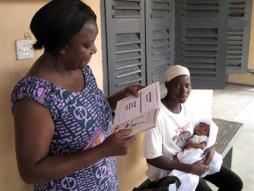The Grameen Foundation
recently released an in-depth report on the
state of MoTeCH, a multi-part project that uses mobile technology to
send pre- and post-natal health information to Ghanaians and allows
community health workers to collect and share health data. Launched in
July 2010 in the Upper East Region of Ghana, the system rolled out
the next phase of the pilot in April 2011 in the Awutu
Senya distract in the Central Region of Ghana. The report, "Mobile
Technology for Community Health in Ghana: What It Is and What
Grameen Foundation Has Learned So Far," takes an honest look at the
progress and challenges the organization has faced while implementing a
long-term, large-scale mHealth project.
Mobile Midwife
Mobile Midwife, part of the MoTeCH initiative, is a mobile phone-based
health education program for pregnant women and recent parents. Women
register for the program and receive either SMS or voice messages with
health information. The organization designed the messages to be
applicable to both men and women, as they anticipated that both
partners would listen to the messages (the report found that 99% of
respondents chose to receive voice messages). The messages were
designed to tell women what to expect during pregnancy, dispel myths
and cultural practices, and provide general health information.
The group met some challenges while translating and recording the
messages,
as there were cultural implications necessary to consider (recommending
diet advice that is applicable to each region in which MoTeCH is
deployed, understanding the capacity of local health centers, the use
of appropriate slang, and using the appropriate dialect for each
region). The group also worked to create a free service, but as they
were unable to develop a toll-free number before the launch of the
practice, they used the culturally relevant practice of “flashing”
(deliberately giving someone a missed call so that they return the
call) which ended up being very popular as users were familiar with the
practice.
The report also covers how the organization marketed MoTeCH, looking
into what worked and what didn't by comparing both direct marketing
from community health workers and MoTeCH field staff to advertisements
in local health centers.
Nurses' Application
The other part of the MoTeCH project is an application for community
health workers; MoTeCH uses a J2ME platform on low-cost GSM mobile
phones to capture,
transmit and manage health data collected by community health workers
during client encounters.
The report explains how the organization overcame several challenges
during the implementation of the nurses' application. For instance,
they had originally planned to have the community health workers use
their own phones to file SMS reports. However, they discovered that
many of the CHWs shared their phones with family and community members,
so patient privacy could have been comprised. They also found that the
detailed syntax needed to file SMS reports led to errors, and that many
phones did not have enough memory to store many SMS drafts. The
organization found that purchasing Java-enabled handsets for the CHWs
was ultimately more cost effective in the long run, as GPRS data
transmission was significantly cheaper than bulk SMS transmissions.
Other challenges included developing a system in which nurses were
responsible for the phones; they found that it was difficult to find a
balance between penalties for losing the phone that were strict enough
to encourage the nurses to take care of the phones, yet not so harsh
that nurses would be reluctant to use the phones out of fear of
financial or professional repercussions. The Grameen Foundation also
found that it was necessary to promote the time-saving aspect of the
nurses' application for automatically compiling reports, as many nurses
originally viewed the application as an addition to their
workflow.
As the program has seen success in its initial pilot and prepares to
roll out the next phase, looking back at lessons learned and challenges
overcome provides a good, honest look at the many different
considerations necessary to implement large-scale mHealth projects. Check
out the report
for
a more in-depth look at lessons learned in everything from technology
development, cultural relevancy, marketing and health research. For
more information, check out MobileActive.org's previous coverage of MoTeCH here.
| New Research! How MoTeCH Uses Mobiles for Maternal Health in Ghana data sheet 3525 Views | |
|---|---|
| Countries: | Ghana |


Post new comment